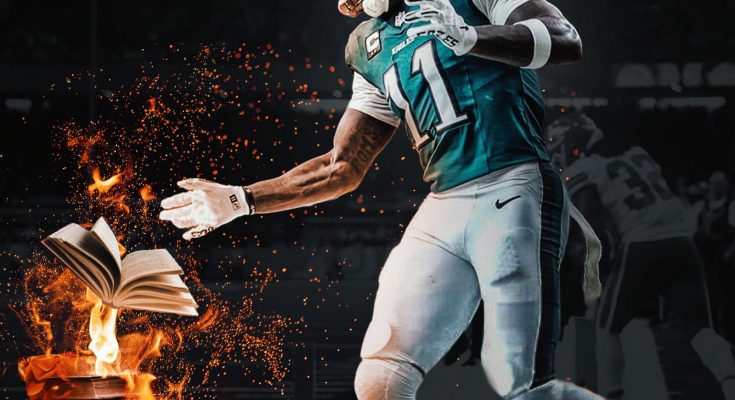Philadelphia Eagles wide receiver AJ Brown has never been shy about showing his personality, whether it’s on the field through his explosive play or off it with his words and actions. His decision to publicly announce that he will no longer read books while watching games is a fascinating glimpse into how athletes navigate their image, their routines, and the unexpected ripple effects of their choices. According to Brown, there will be “no more books available” and “no books will accompany me to the sidelines,” a declaration that he made through insider Jordan Schultz. His reasoning? He doesn’t want to provide “free publicity” anymore. For some, this may seem like a minor footnote in a long NFL season, but for those who understand how the modern sports world works—where image, branding, and sponsorship opportunities intersect with the game itself—it carries far more weight than initially meets the eye.
The sight of a professional athlete reading a book on the sidelines had become one of the more unique quirks associated with AJ Brown. In a league where most sideline shots are filled with players studying tablets, chatting with teammates, or receiving coaching adjustments, Brown standing or sitting calmly with a book in hand stood out. It immediately drew attention from fans, commentators, and media outlets, many of whom praised the image as refreshing and even inspiring. In an environment that thrives on intensity and chaos, there was something striking about a wide receiver—a position often associated with fiery passion and adrenaline—choosing to pass time with a book. It humanized him, it intrigued people, and it sparked discussions about literacy, discipline, and focus.
But what Brown noticed, perhaps more than anyone else, was the unintended consequence: the books he was seen reading began to get attention and traction, effectively giving authors and publishers free promotion. Whether that was through viral photos, sideline commentary, or social media posts dissecting the titles, Brown found himself indirectly functioning as a marketing tool. And while he likely didn’t mind that at first, over time the lack of reciprocity or formal recognition seems to have worn thin. In a sports world where athletes are keenly aware of their value and the potential to monetize their platforms, it makes sense why he’d decide to stop.
Brown’s statement is also reflective of the growing awareness among athletes of how every action they take—whether intentional or not—has brand implications. In the past, an athlete reading a book on the sidelines might have been considered nothing more than an amusing curiosity. In today’s media landscape, however, it’s content. It’s a moment that can go viral, a moment that brands and publishers can capitalize on without ever having to pay the athlete responsible for creating it. AJ Brown is simply acknowledging that reality. He doesn’t want to keep fueling publicity for others while getting nothing in return, particularly when he knows his influence carries real economic weight.
Of course, some fans may lament the decision, arguing that his reading habit symbolized something more than business. To many, it was a positive message that athletes—especially young, Black athletes in the NFL—could embrace reading, education, and intellectual growth as part of their lives. It offered a counter-narrative to stereotypes and encouraged kids and fans to see that knowledge and learning are valuable even at the highest level of sports. Seeing AJ Brown with a book was more than just a quirky image; it was an aspirational one. In stepping away from that practice, even if for logical reasons, there is a loss of that cultural symbolism.
Yet, one can also argue that Brown’s decision actually enhances the broader conversation. By saying he won’t read books on the sideline anymore, he has forced people to think about the transactional nature of publicity in today’s world. Athletes are no longer just performers—they are brands, influencers, and entrepreneurs. If a company benefits from an athlete’s platform, the athlete should benefit as well. Brown has highlighted the imbalance and, in doing so, may even encourage book publishers or literacy programs to reach out to athletes like him with formal partnerships. Imagine the potential impact if AJ Brown, instead of reading casually for free, became a paid ambassador for a literacy initiative or worked with a publishing house to promote works intentionally. His stance could actually lead to more purposeful and impactful efforts in the future.
There’s also a psychological element to consider. Reading on the sidelines wasn’t just a message to fans—it may have been part of Brown’s way of managing the stress and intensity of the game. Athletes often find unique methods to stay grounded during competitions. For some, it’s music; for others, it’s meditation or rituals. For Brown, reading may have provided a sense of calm, focus, and perspective in the middle of a high-pressure environment. By stepping away from it publicly, he’s also revealing his awareness that his every move is scrutinized and that he doesn’t always have the freedom to enjoy simple habits without them being monetized by others. That, in itself, is a fascinating reflection on the trade-offs that come with fame.
In the bigger picture, AJ Brown’s announcement adds another layer to the ongoing evolution of how athletes control their narratives. In an age when social media offers direct communication channels with fans, players can be intentional about shaping how they’re seen and what they endorse. Brown choosing to make this statement through Jordan Schultz ensures that his words reached a broad audience and carried weight. It’s not just a casual decision; it’s a deliberate move that reinforces his agency in deciding how he presents himself.
The timing of this also matters. The Eagles are in the midst of another highly scrutinized season, with expectations sky-high after recent campaigns. Brown has already established himself as one of the best wide receivers in the league, a vital piece of Philadelphia’s offensive juggernaut. His play speaks for itself, but his voice off the field matters too. This decision about books may seem small compared to touchdowns and wins, but it underscores that Brown is mindful of everything connected to his career, both on and off the field. For the Eagles, having a star who is thoughtful, calculated, and protective of his image is a benefit, even if it occasionally stirs debate among fans.
It’s also worth noting that Brown’s declaration could have ripple effects across the league. Other players may look at his stance and start reconsidering their own habits and how they might unintentionally be giving away free publicity. Whether it’s wearing a certain brand, engaging in specific hobbies, or even using particular products on the sidelines, athletes are constantly creating moments that can be commodified. Brown’s message is a reminder that they have the right to question that dynamic and demand more control.
From the fan perspective, there will likely be mixed reactions. Some will support his decision, seeing it as a smart and empowering move that recognizes his value. Others may be disappointed, feeling that the authenticity of his book-reading habit is being sacrificed to business considerations. But that tension is part of what makes this story compelling—it’s not just about AJ Brown, but about the intersection of sports, culture, commerce, and identity.
Brown’s words, “I’m no longer providing free publicity,” could become something of a rallying cry for athletes across sports. They highlight a growing awareness that their every move has value, and that value shouldn’t always be handed out without compensation. In that sense, Brown’s stance is not just about books, but about a broader shift in athlete empowerment. Just as players have gained more control over contracts, free agency, and endorsements, they are also beginning to assert control over the subtler aspects of their public image.
In the end, this chapter in AJ Brown’s career adds depth to his legacy. He will always be remembered for his big plays, his strength after the catch, and his role in the Eagles’ success. But moments like this also show that he is not afraid to think critically about his place in the spotlight. Whether fans agree with his decision or not, they can’t deny that it reflects a thoughtful approach to balancing personal authenticity with the realities of modern sports marketing.
So while the sidelines may no longer feature AJ Brown with a book in hand, the conversation he sparked will linger. His decision challenges fans, media, and businesses to think differently about the value of athletes’ actions, even the seemingly small ones. And for Brown himself, it represents yet another example of him doing things his way, staying true to his beliefs, and refusing to let others profit from his image without his say. Just as he dominates defenders on Sundays, he is determined to dominate the narrative around who he is and what he represents. That’s the mark of a player who understands that greatness extends beyond the field—it lives in every choice, every word, and every stand taken.



